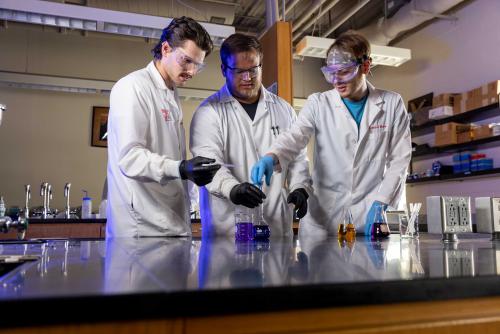Virginia, Kentucky Higher Ed Partnership Awarded $100,000 Collaborative Planning Grant to Improve Central Appalachia Student Access to STEM Careers

Funded by a $100,000 federal grant, the University of Virginia’s College at Wise (UVA Wise) announced today that it is part of a higher education collaborative effort that aims to increase equitable access for low-income Central Appalachian students to science and technology-based education and employment.
The National Science Foundation (NSF) recently awarded a $100,000 planning grant to the Pathways to Access, Collaboration and Equity for Central Appalachian Students (PACE) project.
PACE is a collaboration of three higher education institutions, two in rural Central Appalachia—UVA Wise and Southeast Kentucky Community & Technical College (SKCTC)— and the University of Virginia (UVA).
Increasing access and support for Central Appalachian students to earn Science, Technology, Engineering and Mathematics (STEM) undergraduate degrees is the main mission of the project. It’s also aimed at helping to fill the national demand for trained experts and professionals in STEM.
“This is about ensuring all of the talented students in our region who want to pursue STEM have access to a STEM education and the opportunity to make their contributions to STEM,” said UVA Wise Associate Professor of Biology Josephine Rodriguez, who is a co-principal investigator that served on the original team that secured the grant. “We want to develop the talent and train students to be the brainpower that is needed for a next-generation SWVA workforce.”
This project is funded by NSF’s Scholarships in STEM (S-STEM) program, which seeks to raise the number of low-income academically talented students with demonstrated financial need who earn degrees in STEM fields. It also aims to improve the education of future STEM workers, and to generate knowledge about academic success, retention, transfer, graduation and career pathways of low-income students.
To do that, PACE aims to support students who face greater financial need and provide opportunities through partnerships to expand pathways to help them graduate and land jobs or further their education in STEM fields in graduate school or Ph.D. programs.
“We want students to learn that there are wonderful opportunities available and not wait until they are a junior in college, but start early in their academic journey. We want to raise the awareness there are great opportunities in technology, innovation and STEM from K-12 through a four-year degree and beyond,” said UVA Wise Associate Professor of Information Systems Karen Carter, who will also serve as a co-principal investigator. Carter brings experience in mathematics and computer science and will help the expansion of S-STEM in those areas.
For the next year, PACE will host meetings, planning workshops and a learning series. The group will also conduct an organizational and needs assessment and analyze regional job prospects in preparation for submitting a new multi-institution NSF S-STEM Track 3 proposal for up to $5 million by 2025.
The new effort builds on the success of UVA Wise’s 2018 NSF S-STEM grant. Since then, UVA Wise recruited its first cohort of 26 student scholars, and 13 have graduated and begun STEM careers or graduate programs. PACE benefits from experience with the multi-institutional Virginia–North Carolina Louis Stokes Alliance for Minority Participation, another NSF-funded program that broadens participation in STEM led by UVA.
“These are transformative investments in the lives of our really talented young people,” said Rodriguez, who is the principal investigator for the 2018 NSF S-STEM Track 1 UVA Wise grant. “We’ve already seen the impact of our first NSF grant. This grant allows us to continue our work in supporting our students and tapping into the human potential and capital in our region. It’s endless.”
The 2018 NSF S-STEM grant provided scholarships and other co-curricular support to retain students and increase their preparedness for STEM careers or graduate study. For many of those UVA Wise graduates, a four-year degree would not have been possible without the grant, which empowers students to conduct research, publish papers and present at conferences nationwide.
“By scaling up opportunities for S-STEM students and incorporating their perspectives while empowering them to contribute to solving society’s complex problems, PACE will contribute to the important work of transforming the Central Appalachian region and broadening participation in the STEM workforce,” said UVA Senior Director for Grants Administration and Strategic Partnerships Kristin Morgan, who will serve as principal investigator for the PACE project. Through the planning grant, PACE aims to increase opportunities for students by strengthening existing partnerships and fostering new ones within the region including two-year community colleges, scientific and technical companies as well as the Virginia Community College System, the Appalachia Regional Commission, Kentucky Community and Technical College System (KCTCS) and other regional educational and workforce stakeholders.
“We are thrilled to be a part of this collaboration,” said Wheeler Conover, professor of chemistry at SKCTC who serves as co-principal investigator for the project. “Historically, students who have transferred to UVA Wise from community colleges have enjoyed significant success. As a result, leadership reached out to the community college partners and expanded the program. Our students rarely have these kinds of research opportunities, so it gives our students—including our dual credit students—the opportunity to go down that path and have access to scholarships and STEM-based careers.”